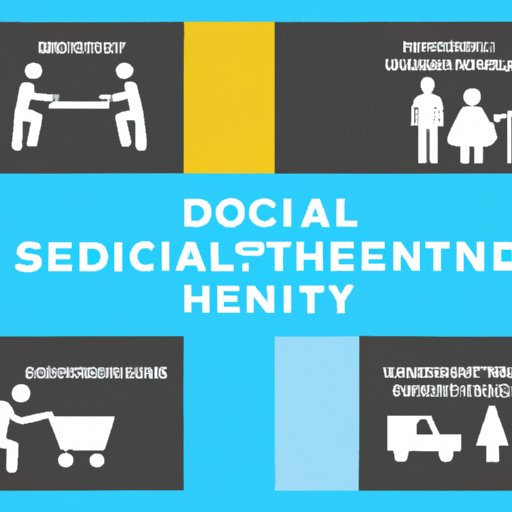Introduction
The social determinants of health are the conditions in which people are born, grow, live, work, and age, and how these conditions affect their physical, mental, and emotional wellbeing. These factors can include income and wealth, education, employment status, social support networks, and access to healthcare services. Understanding the social determinants of health can help us identify the root causes of health issues and find ways to improve the overall health of a population.
The purpose of this article is to explore the five social determinants of health and their impact on mental health and inequalities. We will look at the causes and effects of these social determinants, as well as potential strategies for addressing them. We will also examine the role they play in reducing inequalities.

A Comparison of the Five Social Determinants of Health
Income and wealth are two of the most influential social determinants of health. Income is the amount of money an individual or family earns from wages or investments, while wealth is the total value of assets owned by an individual or family. A person’s income and wealth can have a profound effect on their health, as those with higher incomes and greater wealth often have better access to healthcare and healthier lifestyles.
Education is another important social determinant of health. Education provides individuals with the knowledge and skills needed to lead healthy lives and make informed decisions about their health. Those with higher levels of education tend to have better health outcomes than those with lower levels of education.
Employment status is also a critical social determinant of health. Those who are employed have greater access to resources, such as health insurance and financial stability, which can have a positive impact on their health. On the other hand, those who are unemployed or underemployed may have limited access to resources, leading to poorer health outcomes.
Social support networks are essential for good health. Having supportive relationships with family, friends, and community members can provide emotional and practical support, which can have a positive effect on health. Conversely, having little or no social support can have a negative impact on health.
Finally, access to healthcare services is an important social determinant of health. Those who have access to quality health care services, such as preventive care, screenings, and treatments, are more likely to have better health outcomes than those who do not.

An Overview of the Causes and Effects of Social Determinants of Health
The causes of social determinants of health are complex and multifaceted. They are often rooted in structural inequalities, such as racism, sexism, and other forms of discrimination that limit opportunities and resources for certain groups. Additionally, economic policies, such as minimum wage laws, and cultural norms can also contribute to disparities in health outcomes.
The effects of social determinants of health are wide-reaching and can have a significant impact on individuals and communities. Poor health outcomes, such as increased risk for chronic diseases and poorer mental health, are linked to low income and education levels, unemployment, lack of social support, and inadequate access to healthcare services.
How Can We Address the Social Determinants of Health?
Addressing the social determinants of health requires a multifaceted approach, including policy changes, community engagement, and individual actions. Policies and programs, such as increasing the minimum wage and providing access to quality healthcare, can help reduce disparities in health outcomes. Community engagement, such as creating supportive environments and providing resources to underserved populations, can also help address the social determinants of health. Finally, individuals can take action by advocating for policy changes, supporting local initiatives, and engaging in healthy behaviors.

Examining the Impact of Social Determinants of Health on Mental Health
There is a strong connection between social determinants of health and mental health. Low income, education, and employment status can lead to increased stress and anxiety, which can have a negative impact on mental health. Lack of social support and inadequate access to healthcare can also contribute to poor mental health outcomes.
Potential solutions for addressing the impact of social determinants of health on mental health include improving access to quality mental health services, providing financial assistance, and creating supportive social environments. Additionally, policies and programs that reduce inequality and poverty can help improve mental health outcomes.
Exploring the Role of Social Determinants of Health in Reducing Inequalities
Inequalities in health outcomes are often rooted in the social determinants of health. To reduce these inequalities, it is important to understand the underlying causes and effects of social determinants of health. Strategies for reducing inequalities include increasing access to quality healthcare, investing in education, and implementing policies that promote financial stability. Additionally, engaging in community-led initiatives and advocating for policy changes can help reduce disparities in health outcomes.
Conclusion
In conclusion, the social determinants of health are powerful influences on our health and wellbeing. Income and wealth, education, employment status, social support networks, and access to healthcare services all play an important role in determining our health outcomes. Furthermore, these social determinants can have a significant impact on mental health and inequalities. To address these issues, we must take a multifaceted approach, including policy changes, community engagement, and individual actions.
By understanding the social determinants of health and taking action to address them, we can create a healthier and more equitable society for all.
(Note: Is this article not meeting your expectations? Do you have knowledge or insights to share? Unlock new opportunities and expand your reach by joining our authors team. Click Registration to join us and share your expertise with our readers.)
